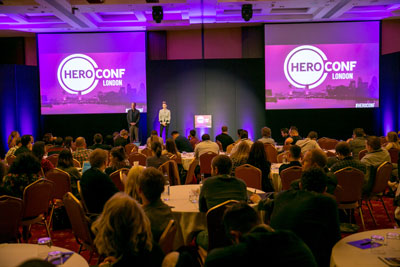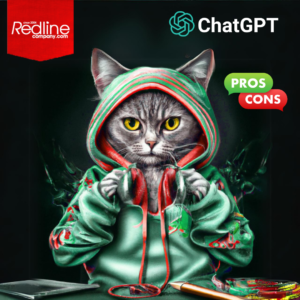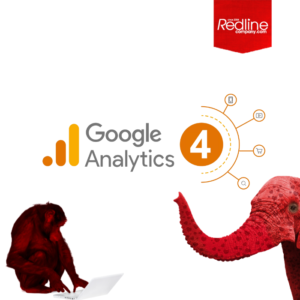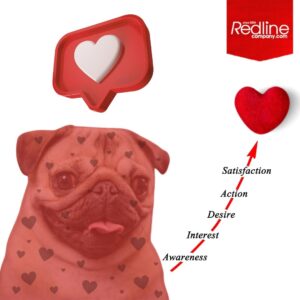MARKETING ON THE NEXT LEVEL
To say we were excited is an understatement. This is how it went down…
OK. We’re in London baby. The clock is ticking…only 4 minutes to go and the excitement is palpable. In only 3.27 minutes we’ll hear the guru of Google and prophet of PPC: Brad Geddes is due to speak. Geddes, the keynote speaker was about to open the first ever Hero Conf. outside of the USA and Redline is on front row, ready to soak up all of the wisdom that he and the other speakers are willing to share with us.
As we will look around, it becomes clear that we’re surrounded by some of the world’s biggest geeks. All are eager to lap up the words of giants from Google, Bing and Facebook. And to borrow a phrase from a well-known burger chain – “we’re loving it”.
The reason we’re here is because Redline Company is all about moving forward. When we started 11 years ago marketing was completely different than it is today and online marketing was in its infancy. The task for any marketer today is to keep up, to stay one step ahead of clients and their prospects.
New platforms are being introduced every quarter. And never before have there been so many different opportunities, which is both exciting and confusing at the same time. Social media, PPC, remarketing, Google Analytics, audience segmentation, mobile devices, Twitter, Facebook and Bing are just the tip of the iceberg.
…As the conference starts, it becomes clear, with a show of hands we see that most people have only been involved with paid search marketing for a couple of years. This is a new but very powerful marketing technique that is constantly changing and developing, and is becoming a brilliant alternative or add-on to the normal marketing mix.
There is only one way to handle an event of this size and that is team work: one person to attend the super nerdy tech seminars and the other to soak up the fluffy stuff.
Here’s a summary of what’s hot in online marketing – now.
GOOGLE IS GOD (OR IS IT?)
Google Adwords is a brilliant marketing platform which gives you access to billions of users worldwide. The Adwords campaign can be constructed using specific keywords and phrases, so that they will only be shown to people who are actually searching for the product that you are selling. However, if the campaigns are not set up correctly, it can be very costly.
The key to success with Adwords is to know what you are doing. Most people don’t have the time to study this art/science in detail. Clients often tell us that they tried to set up a campaign, but they ended up paying Google a lot of money for no results. Whereas well-managed campaigns can deliver incredible results.
But wait, Google has a problem. It became clear during the conference that they don’t have the monopoly. Google doesn’t know enough about the people searching, thereby leaving the door open for their competitor in the paid search arena – Facebook. The social media giant has a bigger market share, offers a much more targeted campaign solution and it is also cheaper.
Without even having to ask us, Facebook already knows everything about us: when you get engaged, when you ‘Like’ a company in your area and even if you’re shopping for new shoes. And the beauty is that we volunteer this information willingly. As a result, their segmentation is more detailed, which makes their paid adverts more targeted than Google is able to offer, at the moment.
FACEBOOK ADVERTISING
The more we hear the more it becomes apparent that Facebook is a powerful and effective tool to be used to advertise to your target market. There is a fundamental difference between Google and Facebook adverts. Google adverts are targeted towards people who are actively searching. Special offers or USPs are used to differentiate your company from other advertisers on the search engine results page (SERP).
On the other hand, Facebook users are passive. The adverts are shown according to their interests, status, location etc. So the adverts need to stand out amongst potentially cluttered timelines in order to grab the attention in those crucial first seconds. Facebook advertising is cheaper than Google (at the moment). Depending on the product and correct targeting incredible results can be achieved.
On balance, the type of product should determine where you should focus your advertising. You need to evaluate whether it’s a luxury or a necessity. People are more likely to search for necessities, as opposed to non-essential or luxury items that would be nice to own but aren’t really needed. Ideally there should be a mix of digital advertising on Facebook and paid search and display.

SPOTTING THE UNICORNS
If you hate Facebook, don’t see the purpose of posting, or find it too time consuming but grudgingly admit that you need to be on it, you’re in good company. It’s time to admit that you need help.
Social media involves sharing information about you with others. People like people. It’s a well-known fact that people buy from people, not faceless organisations.
They want to know about the person behind the business in order to trust you. This is where Facebook and social media in general comes into its own, giving you the opportunity to connect with and to listen to your current and potential customers. Essentially it is the best way to start a two way conversation.
But how do you reach your potential clients and how do you turn them into loyal customers? The first step is to increase your ‘likes’.
There are two ways to do this:
- Run a ‘like’ campaign on Facebook targeting people who would be interested in your business.
- Post content which is interesting and useful, rather than sales messages. When a particular post proves more popular than 90% of your posts, you have a unicorn. You should then ‘boost’ this post so that it can reach more people who could ‘like’ it. When people like your post, they are more likely to like your page, and it all snowballs from there.
Obviously the aim of any marketing activity is to make sales but Facebook works differently. Rather than the big sell, instead it coaxes your customers through the buying funnel. Even if they weren’t initially aware of your company, Facebook campaigns can introduce your products to potential clients and help them to understand how they could be useful. You should then boost the ‘unicorns’ to make sure popular posts can reach even more potential clients. The ‘unicorns’ are clear signs which type of posts people react to and ‘like’ more. Your followers will start to trust you resulting ultimately in a sale.
People power cannot be overstated. When a friend on Facebook follows a particular page and interacts with the content, their friends see this activity and think…hey if my friend likes this brand then they must get her/ his stamp of approval. I’ll like the page too!

BING…THE UNDERDOG
We all know that monopoly isn’t good for consumers and this is also true within the world of paid search and display. This is where Bing comes in.
Bing is an alternative to Google. It is difficult competing against a giant like Google, which is why Bing and Microsoft have come up with an ingenious (or disingenuous depending on your point of view) way of gaining market share. All Microsoft products that are sold today have Bing integrated as a default. This means when you purchase a new Microsoft computer…you get Bing as the default search engine. And it’s the same story with Samsung Smart TVs. So unless you actively choose to search with Google you will automatically search with Bing.
It is very healthy to have competition in any industry, especially for marketing purposes. It forces compliance and reduces the opportunity for taking advantage of users. Currently CPC on Bing is cheaper than on Google and with their rapidly increasing market share, advertising and SEO for Bing ought to be considered an essential element of your digital advertising plan.
REMARKETING: EFFECTIVE OR JUST PLAIN CREEPY?
Remarket to your visitors and it can be done on Google, Bing and Facebook. It’s such a simple yet brilliant concept. Just imagine: a prospect visits your website, views a few pages and leaves without purchasing. End of story. Now remarketing allows you to advertise specifically to those people, giving you another chance to get them back to your website, possibly with a discount, to entice them to buy. And it gets even better, you only pay when a user clicks on your advert, so you are effectively getting valuable free branding.
However you have to be careful and to plan your campaign well, otherwise potential customers may feel like they are being stalked by your company. There is a fine line that can be very easily crossed, which has already led to an increase in ‘adblockers’ which are designed to prevent this type of advert from being viewed. Therefore it’s essential that you have the right settings and advertising messages.
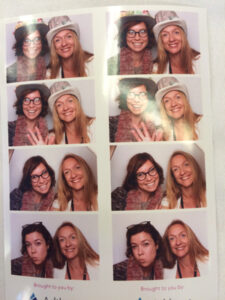
Remarketing can be done on Google, Bing and Facebook
This year Google has taken it one step further by bringing out native ads. The process involves uploading your client database and Google will then crosscheck the email addresses to Google accounts. It provides an excellent opportunity to either upsell to current clients who have already purchased or you can reach potential clients who have yet to do so. Those targeted will then see adverts offering tailor made discounts to entice them to purchase. This is people marketing, communicating on an individual level.
With Facebook you can also upload your database and remarket to clients (and potential clients) by cross-referencing their email addresses to their Facebook account email accounts.
Cross device marketing
How many of you have a smartphone? How many of you own a computer? OK and now how many people use a tablet?
Statistics of growth in cross device usage
“The number of smartphone users worldwide will surpass 2 billion in 2016, according to new figures from eMarketer—after nearly getting there in 2015. In 2015 there were over 1.91 billion smartphone users across the globe, a figure that will increase another 12.6% to near 2.16 billion in 2016.”
Stats from www.emarketer.com
The days of using only a computer to search, compare and buy online are long gone. Now your buyers’ journey looks more like something like this…
…In the morning you are on your phone checking Facebook. Then at work you are on the computer. On your lunch break you are perhaps on a tablet and then on your commute back home or on your way at to the shops you are back on your mobile. Constantly researching, comparing, on Facebook, buying etc…
As a business owner you need to interact with your clients on all of these devices. Every stage of their online activity is an opportunity for you to sell to them and to create relationships. Your marketing strategy should reflect this.
It would be madness to try to cover everything in just one article, so watch out for future updates on:
